Organisational Behaviour: TESCO's Culture, Power, and Motivation
VerifiedAdded on 2023/01/13
|14
|4353
|47
Report
AI Summary
This report provides a comprehensive analysis of organisational behaviour within TESCO, a major retail industry. It begins by defining organisational behaviour and its importance, particularly focusing on how TESCO's human resource management can foster a positive work environment. The report examines the influence of organizational culture, power, and politics on individual and team behaviour, using Handy's cultural typology and Hofstede's cultural dimensions. It then evaluates content and process theories of motivation, including Maslow's hierarchy, Alderfer's ERG theory, goal theory, and equity theory, to explain how these theories can achieve organisational goals. The analysis extends to team development models, particularly Tuckman's model, and discusses the characteristics of effective and ineffective teams. The report also explores the application of organisational behaviour concepts within a business context, emphasizing the interrelation between culture, politics, power, and motivation to achieve team and organisational success. Finally, the report offers recommendations on reward systems and positive organizational politics to enhance employee loyalty and goal attainment.
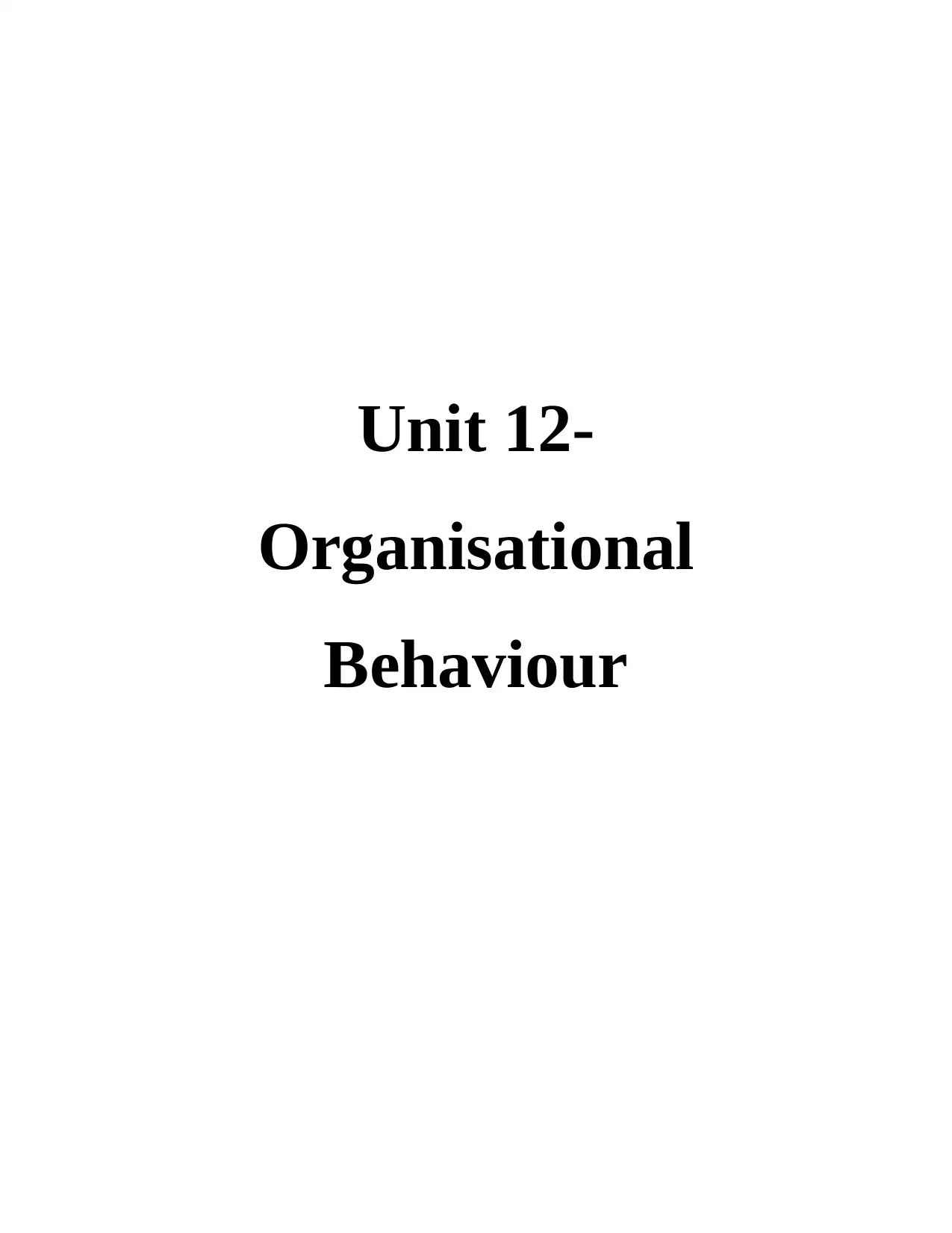
Unit 12-
Organisational
Behaviour
Organisational
Behaviour
Paraphrase This Document
Need a fresh take? Get an instant paraphrase of this document with our AI Paraphraser
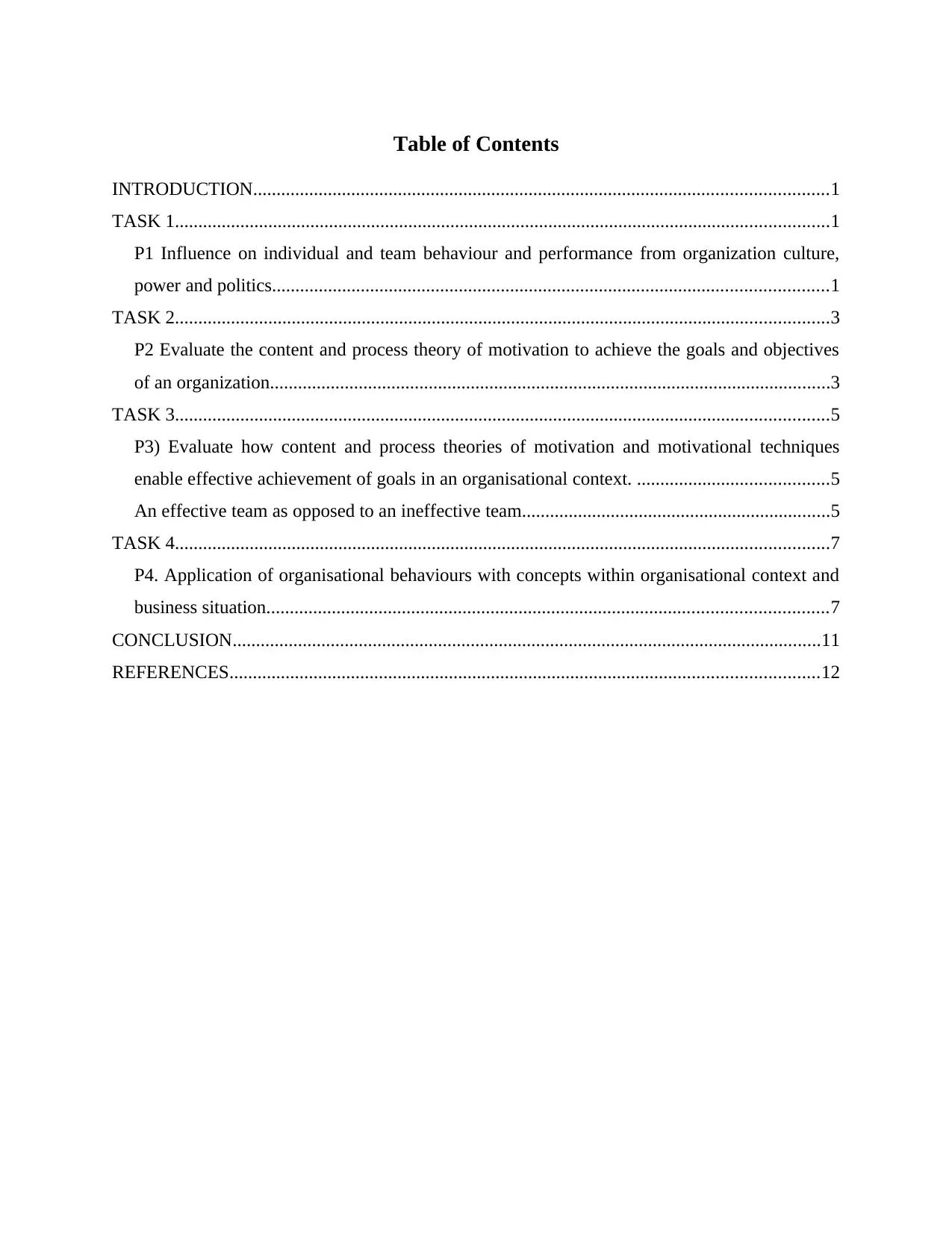
Table of Contents
INTRODUCTION...........................................................................................................................1
TASK 1............................................................................................................................................1
P1 Influence on individual and team behaviour and performance from organization culture,
power and politics.......................................................................................................................1
TASK 2............................................................................................................................................3
P2 Evaluate the content and process theory of motivation to achieve the goals and objectives
of an organization........................................................................................................................3
TASK 3............................................................................................................................................5
P3) Evaluate how content and process theories of motivation and motivational techniques
enable effective achievement of goals in an organisational context. .........................................5
An effective team as opposed to an ineffective team..................................................................5
TASK 4............................................................................................................................................7
P4. Application of organisational behaviours with concepts within organisational context and
business situation........................................................................................................................7
CONCLUSION..............................................................................................................................11
REFERENCES..............................................................................................................................12
INTRODUCTION...........................................................................................................................1
TASK 1............................................................................................................................................1
P1 Influence on individual and team behaviour and performance from organization culture,
power and politics.......................................................................................................................1
TASK 2............................................................................................................................................3
P2 Evaluate the content and process theory of motivation to achieve the goals and objectives
of an organization........................................................................................................................3
TASK 3............................................................................................................................................5
P3) Evaluate how content and process theories of motivation and motivational techniques
enable effective achievement of goals in an organisational context. .........................................5
An effective team as opposed to an ineffective team..................................................................5
TASK 4............................................................................................................................................7
P4. Application of organisational behaviours with concepts within organisational context and
business situation........................................................................................................................7
CONCLUSION..............................................................................................................................11
REFERENCES..............................................................................................................................12
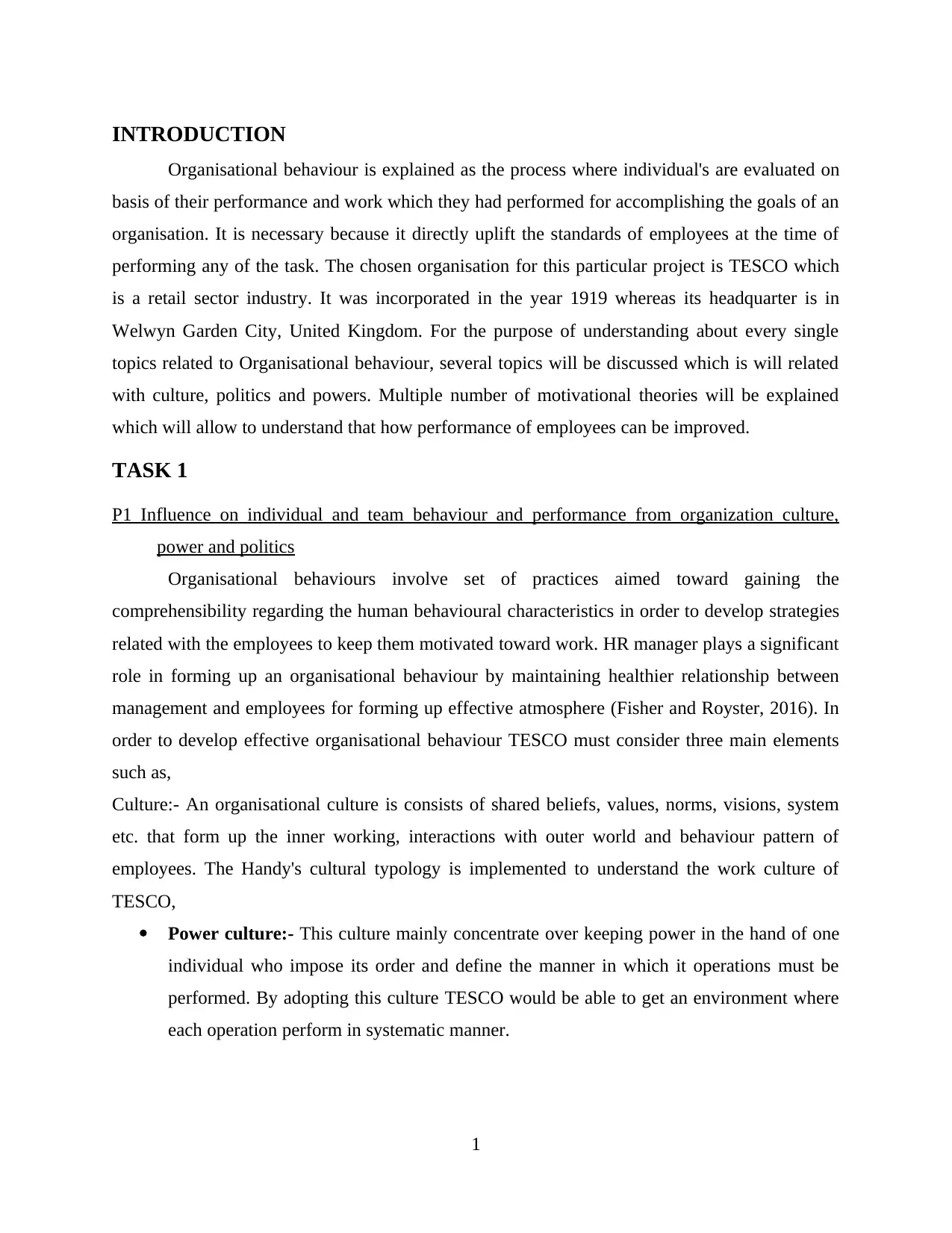
INTRODUCTION
Organisational behaviour is explained as the process where individual's are evaluated on
basis of their performance and work which they had performed for accomplishing the goals of an
organisation. It is necessary because it directly uplift the standards of employees at the time of
performing any of the task. The chosen organisation for this particular project is TESCO which
is a retail sector industry. It was incorporated in the year 1919 whereas its headquarter is in
Welwyn Garden City, United Kingdom. For the purpose of understanding about every single
topics related to Organisational behaviour, several topics will be discussed which is will related
with culture, politics and powers. Multiple number of motivational theories will be explained
which will allow to understand that how performance of employees can be improved.
TASK 1
P1 Influence on individual and team behaviour and performance from organization culture,
power and politics
Organisational behaviours involve set of practices aimed toward gaining the
comprehensibility regarding the human behavioural characteristics in order to develop strategies
related with the employees to keep them motivated toward work. HR manager plays a significant
role in forming up an organisational behaviour by maintaining healthier relationship between
management and employees for forming up effective atmosphere (Fisher and Royster, 2016). In
order to develop effective organisational behaviour TESCO must consider three main elements
such as,
Culture:- An organisational culture is consists of shared beliefs, values, norms, visions, system
etc. that form up the inner working, interactions with outer world and behaviour pattern of
employees. The Handy's cultural typology is implemented to understand the work culture of
TESCO,
Power culture:- This culture mainly concentrate over keeping power in the hand of one
individual who impose its order and define the manner in which it operations must be
performed. By adopting this culture TESCO would be able to get an environment where
each operation perform in systematic manner.
1
Organisational behaviour is explained as the process where individual's are evaluated on
basis of their performance and work which they had performed for accomplishing the goals of an
organisation. It is necessary because it directly uplift the standards of employees at the time of
performing any of the task. The chosen organisation for this particular project is TESCO which
is a retail sector industry. It was incorporated in the year 1919 whereas its headquarter is in
Welwyn Garden City, United Kingdom. For the purpose of understanding about every single
topics related to Organisational behaviour, several topics will be discussed which is will related
with culture, politics and powers. Multiple number of motivational theories will be explained
which will allow to understand that how performance of employees can be improved.
TASK 1
P1 Influence on individual and team behaviour and performance from organization culture,
power and politics
Organisational behaviours involve set of practices aimed toward gaining the
comprehensibility regarding the human behavioural characteristics in order to develop strategies
related with the employees to keep them motivated toward work. HR manager plays a significant
role in forming up an organisational behaviour by maintaining healthier relationship between
management and employees for forming up effective atmosphere (Fisher and Royster, 2016). In
order to develop effective organisational behaviour TESCO must consider three main elements
such as,
Culture:- An organisational culture is consists of shared beliefs, values, norms, visions, system
etc. that form up the inner working, interactions with outer world and behaviour pattern of
employees. The Handy's cultural typology is implemented to understand the work culture of
TESCO,
Power culture:- This culture mainly concentrate over keeping power in the hand of one
individual who impose its order and define the manner in which it operations must be
performed. By adopting this culture TESCO would be able to get an environment where
each operation perform in systematic manner.
1
⊘ This is a preview!⊘
Do you want full access?
Subscribe today to unlock all pages.

Trusted by 1+ million students worldwide
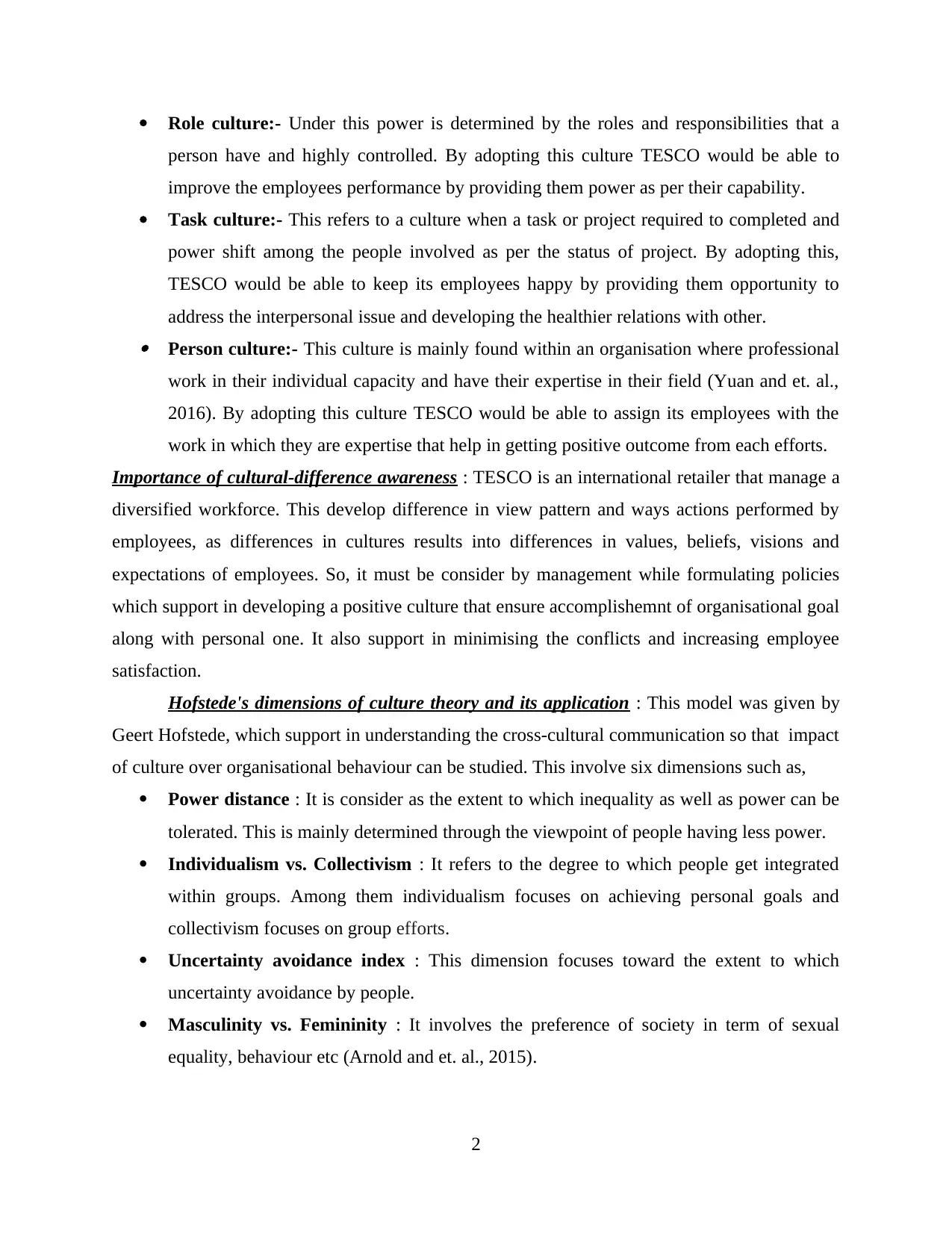
Role culture:- Under this power is determined by the roles and responsibilities that a
person have and highly controlled. By adopting this culture TESCO would be able to
improve the employees performance by providing them power as per their capability.
Task culture:- This refers to a culture when a task or project required to completed and
power shift among the people involved as per the status of project. By adopting this,
TESCO would be able to keep its employees happy by providing them opportunity to
address the interpersonal issue and developing the healthier relations with other. Person culture:- This culture is mainly found within an organisation where professional
work in their individual capacity and have their expertise in their field (Yuan and et. al.,
2016). By adopting this culture TESCO would be able to assign its employees with the
work in which they are expertise that help in getting positive outcome from each efforts.
Importance of cultural-difference awareness : TESCO is an international retailer that manage a
diversified workforce. This develop difference in view pattern and ways actions performed by
employees, as differences in cultures results into differences in values, beliefs, visions and
expectations of employees. So, it must be consider by management while formulating policies
which support in developing a positive culture that ensure accomplishemnt of organisational goal
along with personal one. It also support in minimising the conflicts and increasing employee
satisfaction.
Hofstede's dimensions of culture theory and its application : This model was given by
Geert Hofstede, which support in understanding the cross-cultural communication so that impact
of culture over organisational behaviour can be studied. This involve six dimensions such as,
Power distance : It is consider as the extent to which inequality as well as power can be
tolerated. This is mainly determined through the viewpoint of people having less power.
Individualism vs. Collectivism : It refers to the degree to which people get integrated
within groups. Among them individualism focuses on achieving personal goals and
collectivism focuses on group efforts.
Uncertainty avoidance index : This dimension focuses toward the extent to which
uncertainty avoidance by people.
Masculinity vs. Femininity : It involves the preference of society in term of sexual
equality, behaviour etc (Arnold and et. al., 2015).
2
person have and highly controlled. By adopting this culture TESCO would be able to
improve the employees performance by providing them power as per their capability.
Task culture:- This refers to a culture when a task or project required to completed and
power shift among the people involved as per the status of project. By adopting this,
TESCO would be able to keep its employees happy by providing them opportunity to
address the interpersonal issue and developing the healthier relations with other. Person culture:- This culture is mainly found within an organisation where professional
work in their individual capacity and have their expertise in their field (Yuan and et. al.,
2016). By adopting this culture TESCO would be able to assign its employees with the
work in which they are expertise that help in getting positive outcome from each efforts.
Importance of cultural-difference awareness : TESCO is an international retailer that manage a
diversified workforce. This develop difference in view pattern and ways actions performed by
employees, as differences in cultures results into differences in values, beliefs, visions and
expectations of employees. So, it must be consider by management while formulating policies
which support in developing a positive culture that ensure accomplishemnt of organisational goal
along with personal one. It also support in minimising the conflicts and increasing employee
satisfaction.
Hofstede's dimensions of culture theory and its application : This model was given by
Geert Hofstede, which support in understanding the cross-cultural communication so that impact
of culture over organisational behaviour can be studied. This involve six dimensions such as,
Power distance : It is consider as the extent to which inequality as well as power can be
tolerated. This is mainly determined through the viewpoint of people having less power.
Individualism vs. Collectivism : It refers to the degree to which people get integrated
within groups. Among them individualism focuses on achieving personal goals and
collectivism focuses on group efforts.
Uncertainty avoidance index : This dimension focuses toward the extent to which
uncertainty avoidance by people.
Masculinity vs. Femininity : It involves the preference of society in term of sexual
equality, behaviour etc (Arnold and et. al., 2015).
2
Paraphrase This Document
Need a fresh take? Get an instant paraphrase of this document with our AI Paraphraser
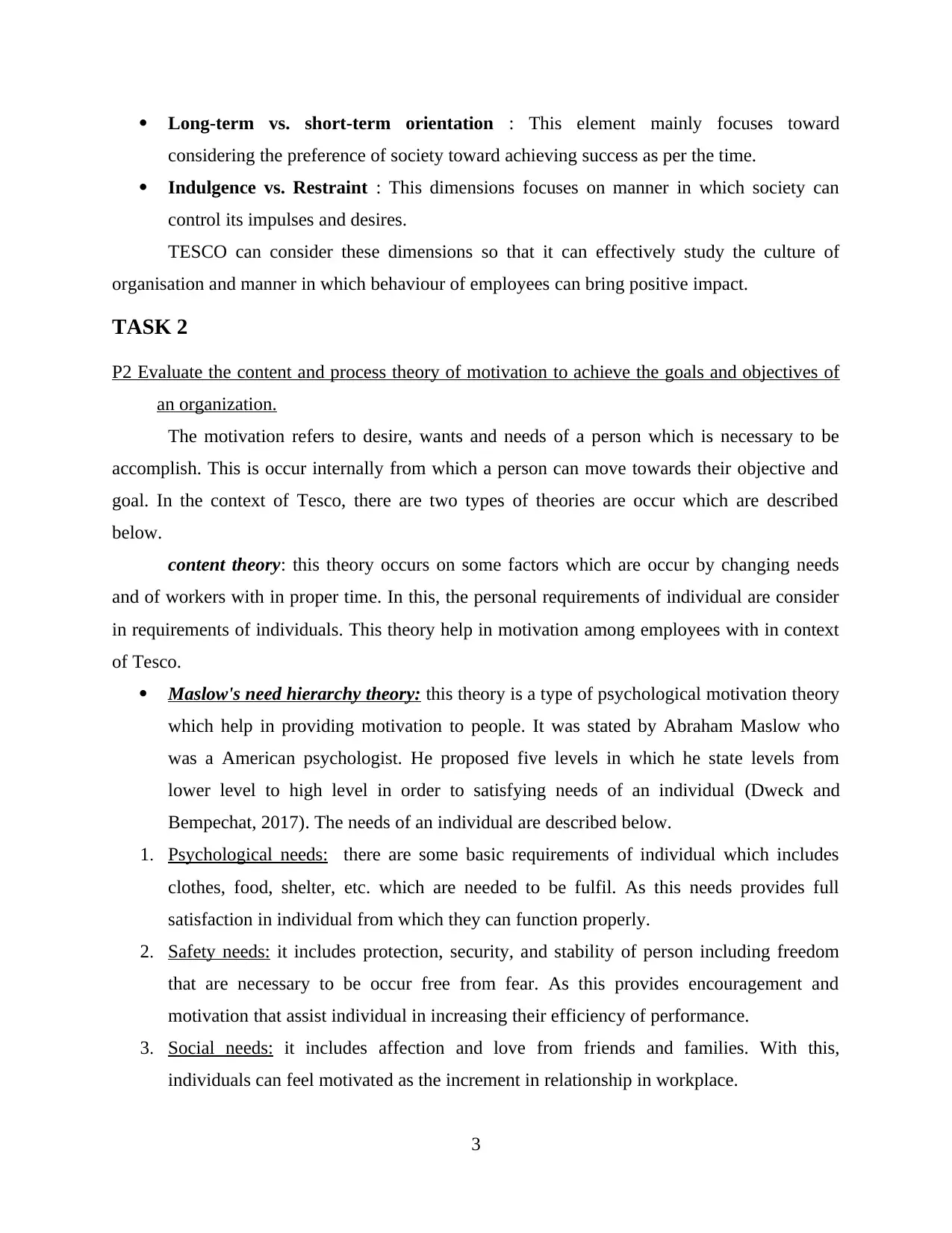
Long-term vs. short-term orientation : This element mainly focuses toward
considering the preference of society toward achieving success as per the time.
Indulgence vs. Restraint : This dimensions focuses on manner in which society can
control its impulses and desires.
TESCO can consider these dimensions so that it can effectively study the culture of
organisation and manner in which behaviour of employees can bring positive impact.
TASK 2
P2 Evaluate the content and process theory of motivation to achieve the goals and objectives of
an organization.
The motivation refers to desire, wants and needs of a person which is necessary to be
accomplish. This is occur internally from which a person can move towards their objective and
goal. In the context of Tesco, there are two types of theories are occur which are described
below.
content theory: this theory occurs on some factors which are occur by changing needs
and of workers with in proper time. In this, the personal requirements of individual are consider
in requirements of individuals. This theory help in motivation among employees with in context
of Tesco.
Maslow's need hierarchy theory: this theory is a type of psychological motivation theory
which help in providing motivation to people. It was stated by Abraham Maslow who
was a American psychologist. He proposed five levels in which he state levels from
lower level to high level in order to satisfying needs of an individual (Dweck and
Bempechat, 2017). The needs of an individual are described below.
1. Psychological needs: there are some basic requirements of individual which includes
clothes, food, shelter, etc. which are needed to be fulfil. As this needs provides full
satisfaction in individual from which they can function properly.
2. Safety needs: it includes protection, security, and stability of person including freedom
that are necessary to be occur free from fear. As this provides encouragement and
motivation that assist individual in increasing their efficiency of performance.
3. Social needs: it includes affection and love from friends and families. With this,
individuals can feel motivated as the increment in relationship in workplace.
3
considering the preference of society toward achieving success as per the time.
Indulgence vs. Restraint : This dimensions focuses on manner in which society can
control its impulses and desires.
TESCO can consider these dimensions so that it can effectively study the culture of
organisation and manner in which behaviour of employees can bring positive impact.
TASK 2
P2 Evaluate the content and process theory of motivation to achieve the goals and objectives of
an organization.
The motivation refers to desire, wants and needs of a person which is necessary to be
accomplish. This is occur internally from which a person can move towards their objective and
goal. In the context of Tesco, there are two types of theories are occur which are described
below.
content theory: this theory occurs on some factors which are occur by changing needs
and of workers with in proper time. In this, the personal requirements of individual are consider
in requirements of individuals. This theory help in motivation among employees with in context
of Tesco.
Maslow's need hierarchy theory: this theory is a type of psychological motivation theory
which help in providing motivation to people. It was stated by Abraham Maslow who
was a American psychologist. He proposed five levels in which he state levels from
lower level to high level in order to satisfying needs of an individual (Dweck and
Bempechat, 2017). The needs of an individual are described below.
1. Psychological needs: there are some basic requirements of individual which includes
clothes, food, shelter, etc. which are needed to be fulfil. As this needs provides full
satisfaction in individual from which they can function properly.
2. Safety needs: it includes protection, security, and stability of person including freedom
that are necessary to be occur free from fear. As this provides encouragement and
motivation that assist individual in increasing their efficiency of performance.
3. Social needs: it includes affection and love from friends and families. With this,
individuals can feel motivated as the increment in relationship in workplace.
3
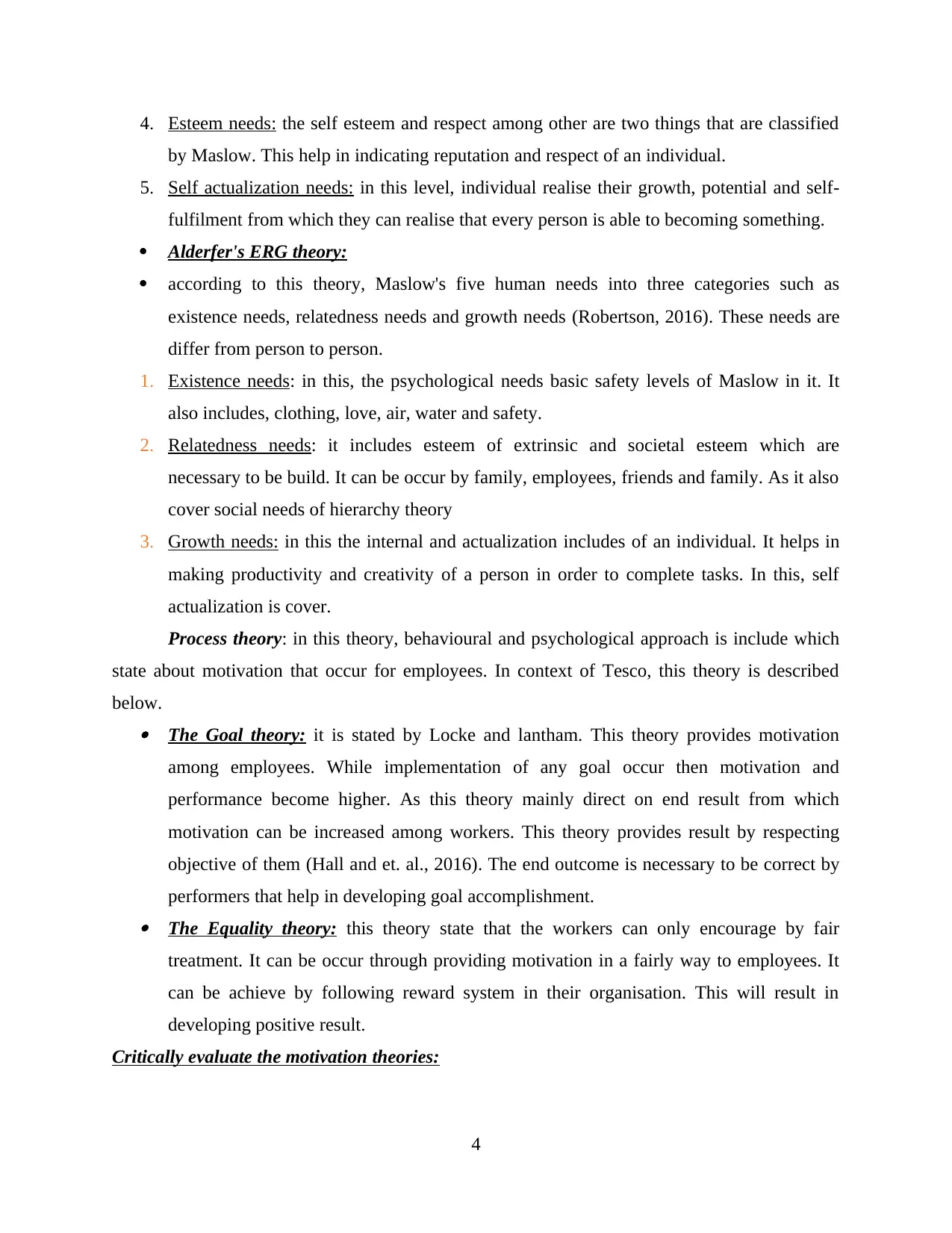
4. Esteem needs: the self esteem and respect among other are two things that are classified
by Maslow. This help in indicating reputation and respect of an individual.
5. Self actualization needs: in this level, individual realise their growth, potential and self-
fulfilment from which they can realise that every person is able to becoming something.
Alderfer's ERG theory:
according to this theory, Maslow's five human needs into three categories such as
existence needs, relatedness needs and growth needs (Robertson, 2016). These needs are
differ from person to person.
1. Existence needs: in this, the psychological needs basic safety levels of Maslow in it. It
also includes, clothing, love, air, water and safety.
2. Relatedness needs: it includes esteem of extrinsic and societal esteem which are
necessary to be build. It can be occur by family, employees, friends and family. As it also
cover social needs of hierarchy theory
3. Growth needs: in this the internal and actualization includes of an individual. It helps in
making productivity and creativity of a person in order to complete tasks. In this, self
actualization is cover.
Process theory: in this theory, behavioural and psychological approach is include which
state about motivation that occur for employees. In context of Tesco, this theory is described
below. The Goal theory: it is stated by Locke and lantham. This theory provides motivation
among employees. While implementation of any goal occur then motivation and
performance become higher. As this theory mainly direct on end result from which
motivation can be increased among workers. This theory provides result by respecting
objective of them (Hall and et. al., 2016). The end outcome is necessary to be correct by
performers that help in developing goal accomplishment. The Equality theory: this theory state that the workers can only encourage by fair
treatment. It can be occur through providing motivation in a fairly way to employees. It
can be achieve by following reward system in their organisation. This will result in
developing positive result.
Critically evaluate the motivation theories:
4
by Maslow. This help in indicating reputation and respect of an individual.
5. Self actualization needs: in this level, individual realise their growth, potential and self-
fulfilment from which they can realise that every person is able to becoming something.
Alderfer's ERG theory:
according to this theory, Maslow's five human needs into three categories such as
existence needs, relatedness needs and growth needs (Robertson, 2016). These needs are
differ from person to person.
1. Existence needs: in this, the psychological needs basic safety levels of Maslow in it. It
also includes, clothing, love, air, water and safety.
2. Relatedness needs: it includes esteem of extrinsic and societal esteem which are
necessary to be build. It can be occur by family, employees, friends and family. As it also
cover social needs of hierarchy theory
3. Growth needs: in this the internal and actualization includes of an individual. It helps in
making productivity and creativity of a person in order to complete tasks. In this, self
actualization is cover.
Process theory: in this theory, behavioural and psychological approach is include which
state about motivation that occur for employees. In context of Tesco, this theory is described
below. The Goal theory: it is stated by Locke and lantham. This theory provides motivation
among employees. While implementation of any goal occur then motivation and
performance become higher. As this theory mainly direct on end result from which
motivation can be increased among workers. This theory provides result by respecting
objective of them (Hall and et. al., 2016). The end outcome is necessary to be correct by
performers that help in developing goal accomplishment. The Equality theory: this theory state that the workers can only encourage by fair
treatment. It can be occur through providing motivation in a fairly way to employees. It
can be achieve by following reward system in their organisation. This will result in
developing positive result.
Critically evaluate the motivation theories:
4
⊘ This is a preview!⊘
Do you want full access?
Subscribe today to unlock all pages.

Trusted by 1+ million students worldwide
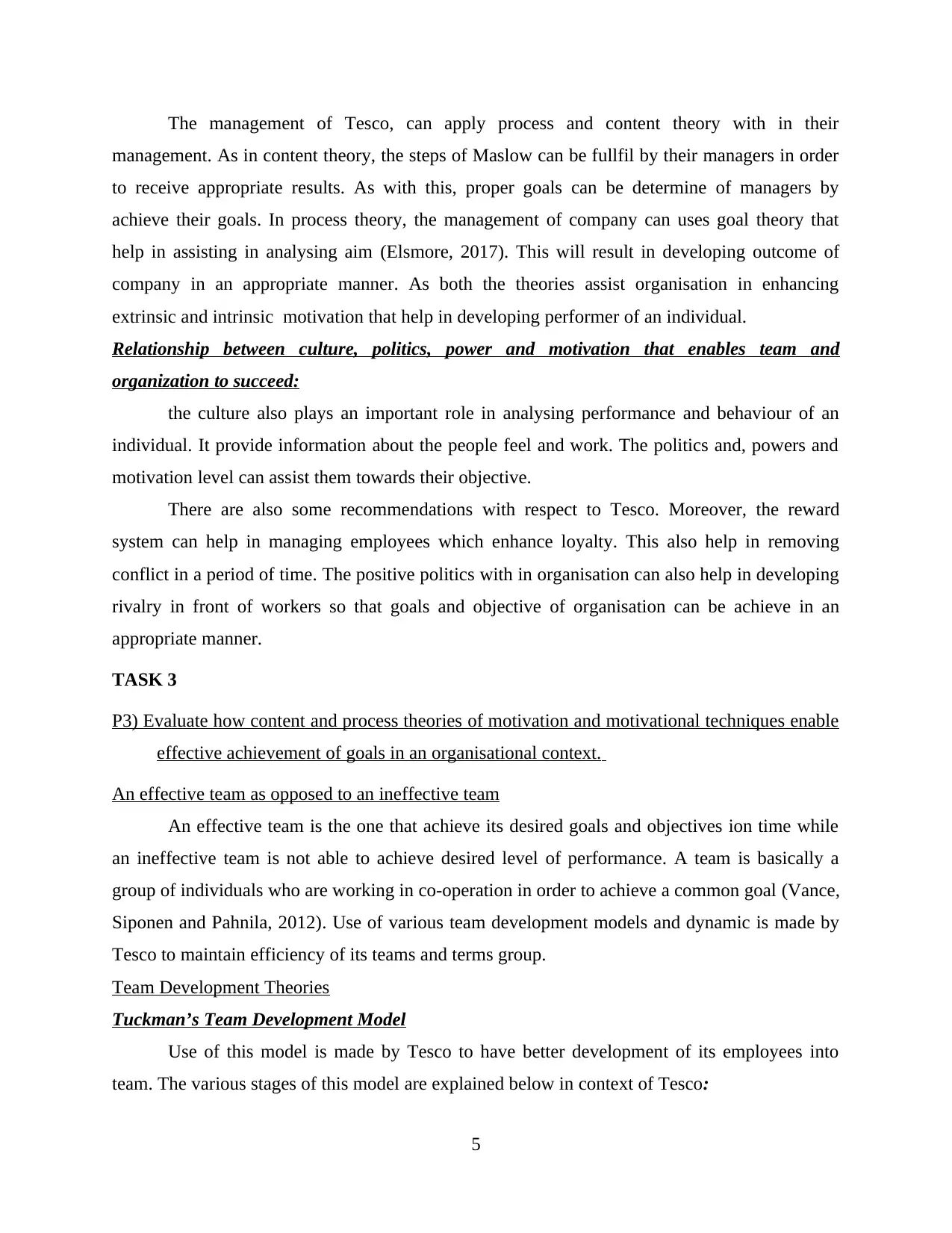
The management of Tesco, can apply process and content theory with in their
management. As in content theory, the steps of Maslow can be fullfil by their managers in order
to receive appropriate results. As with this, proper goals can be determine of managers by
achieve their goals. In process theory, the management of company can uses goal theory that
help in assisting in analysing aim (Elsmore, 2017). This will result in developing outcome of
company in an appropriate manner. As both the theories assist organisation in enhancing
extrinsic and intrinsic motivation that help in developing performer of an individual.
Relationship between culture, politics, power and motivation that enables team and
organization to succeed:
the culture also plays an important role in analysing performance and behaviour of an
individual. It provide information about the people feel and work. The politics and, powers and
motivation level can assist them towards their objective.
There are also some recommendations with respect to Tesco. Moreover, the reward
system can help in managing employees which enhance loyalty. This also help in removing
conflict in a period of time. The positive politics with in organisation can also help in developing
rivalry in front of workers so that goals and objective of organisation can be achieve in an
appropriate manner.
TASK 3
P3) Evaluate how content and process theories of motivation and motivational techniques enable
effective achievement of goals in an organisational context.
An effective team as opposed to an ineffective team
An effective team is the one that achieve its desired goals and objectives ion time while
an ineffective team is not able to achieve desired level of performance. A team is basically a
group of individuals who are working in co-operation in order to achieve a common goal (Vance,
Siponen and Pahnila, 2012). Use of various team development models and dynamic is made by
Tesco to maintain efficiency of its teams and terms group.
Team Development Theories
Tuckman’s Team Development Model
Use of this model is made by Tesco to have better development of its employees into
team. The various stages of this model are explained below in context of Tesco:
5
management. As in content theory, the steps of Maslow can be fullfil by their managers in order
to receive appropriate results. As with this, proper goals can be determine of managers by
achieve their goals. In process theory, the management of company can uses goal theory that
help in assisting in analysing aim (Elsmore, 2017). This will result in developing outcome of
company in an appropriate manner. As both the theories assist organisation in enhancing
extrinsic and intrinsic motivation that help in developing performer of an individual.
Relationship between culture, politics, power and motivation that enables team and
organization to succeed:
the culture also plays an important role in analysing performance and behaviour of an
individual. It provide information about the people feel and work. The politics and, powers and
motivation level can assist them towards their objective.
There are also some recommendations with respect to Tesco. Moreover, the reward
system can help in managing employees which enhance loyalty. This also help in removing
conflict in a period of time. The positive politics with in organisation can also help in developing
rivalry in front of workers so that goals and objective of organisation can be achieve in an
appropriate manner.
TASK 3
P3) Evaluate how content and process theories of motivation and motivational techniques enable
effective achievement of goals in an organisational context.
An effective team as opposed to an ineffective team
An effective team is the one that achieve its desired goals and objectives ion time while
an ineffective team is not able to achieve desired level of performance. A team is basically a
group of individuals who are working in co-operation in order to achieve a common goal (Vance,
Siponen and Pahnila, 2012). Use of various team development models and dynamic is made by
Tesco to maintain efficiency of its teams and terms group.
Team Development Theories
Tuckman’s Team Development Model
Use of this model is made by Tesco to have better development of its employees into
team. The various stages of this model are explained below in context of Tesco:
5
Paraphrase This Document
Need a fresh take? Get an instant paraphrase of this document with our AI Paraphraser
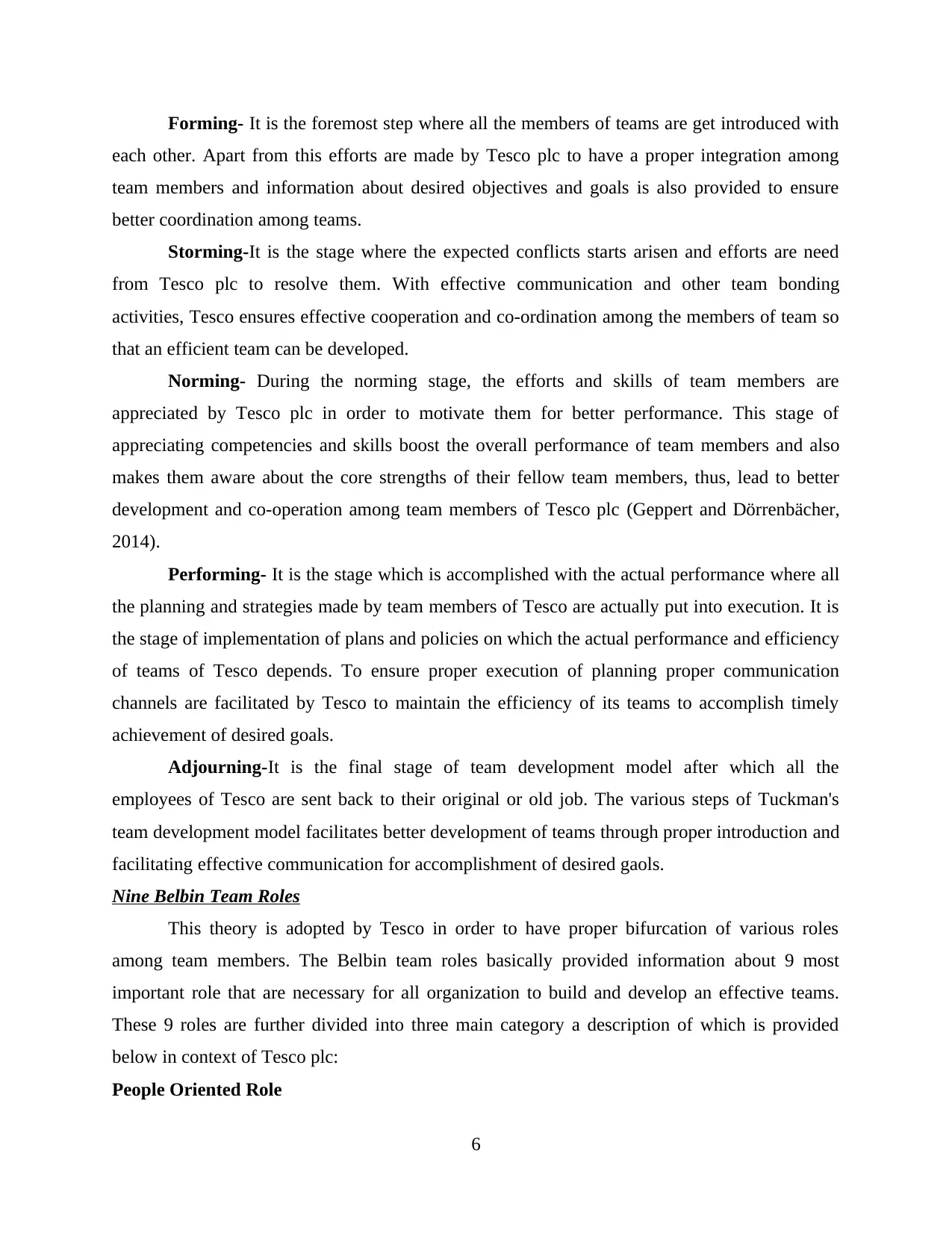
Forming- It is the foremost step where all the members of teams are get introduced with
each other. Apart from this efforts are made by Tesco plc to have a proper integration among
team members and information about desired objectives and goals is also provided to ensure
better coordination among teams.
Storming-It is the stage where the expected conflicts starts arisen and efforts are need
from Tesco plc to resolve them. With effective communication and other team bonding
activities, Tesco ensures effective cooperation and co-ordination among the members of team so
that an efficient team can be developed.
Norming- During the norming stage, the efforts and skills of team members are
appreciated by Tesco plc in order to motivate them for better performance. This stage of
appreciating competencies and skills boost the overall performance of team members and also
makes them aware about the core strengths of their fellow team members, thus, lead to better
development and co-operation among team members of Tesco plc (Geppert and Dörrenbächer,
2014).
Performing- It is the stage which is accomplished with the actual performance where all
the planning and strategies made by team members of Tesco are actually put into execution. It is
the stage of implementation of plans and policies on which the actual performance and efficiency
of teams of Tesco depends. To ensure proper execution of planning proper communication
channels are facilitated by Tesco to maintain the efficiency of its teams to accomplish timely
achievement of desired goals.
Adjourning-It is the final stage of team development model after which all the
employees of Tesco are sent back to their original or old job. The various steps of Tuckman's
team development model facilitates better development of teams through proper introduction and
facilitating effective communication for accomplishment of desired gaols.
Nine Belbin Team Roles
This theory is adopted by Tesco in order to have proper bifurcation of various roles
among team members. The Belbin team roles basically provided information about 9 most
important role that are necessary for all organization to build and develop an effective teams.
These 9 roles are further divided into three main category a description of which is provided
below in context of Tesco plc:
People Oriented Role
6
each other. Apart from this efforts are made by Tesco plc to have a proper integration among
team members and information about desired objectives and goals is also provided to ensure
better coordination among teams.
Storming-It is the stage where the expected conflicts starts arisen and efforts are need
from Tesco plc to resolve them. With effective communication and other team bonding
activities, Tesco ensures effective cooperation and co-ordination among the members of team so
that an efficient team can be developed.
Norming- During the norming stage, the efforts and skills of team members are
appreciated by Tesco plc in order to motivate them for better performance. This stage of
appreciating competencies and skills boost the overall performance of team members and also
makes them aware about the core strengths of their fellow team members, thus, lead to better
development and co-operation among team members of Tesco plc (Geppert and Dörrenbächer,
2014).
Performing- It is the stage which is accomplished with the actual performance where all
the planning and strategies made by team members of Tesco are actually put into execution. It is
the stage of implementation of plans and policies on which the actual performance and efficiency
of teams of Tesco depends. To ensure proper execution of planning proper communication
channels are facilitated by Tesco to maintain the efficiency of its teams to accomplish timely
achievement of desired goals.
Adjourning-It is the final stage of team development model after which all the
employees of Tesco are sent back to their original or old job. The various steps of Tuckman's
team development model facilitates better development of teams through proper introduction and
facilitating effective communication for accomplishment of desired gaols.
Nine Belbin Team Roles
This theory is adopted by Tesco in order to have proper bifurcation of various roles
among team members. The Belbin team roles basically provided information about 9 most
important role that are necessary for all organization to build and develop an effective teams.
These 9 roles are further divided into three main category a description of which is provided
below in context of Tesco plc:
People Oriented Role
6
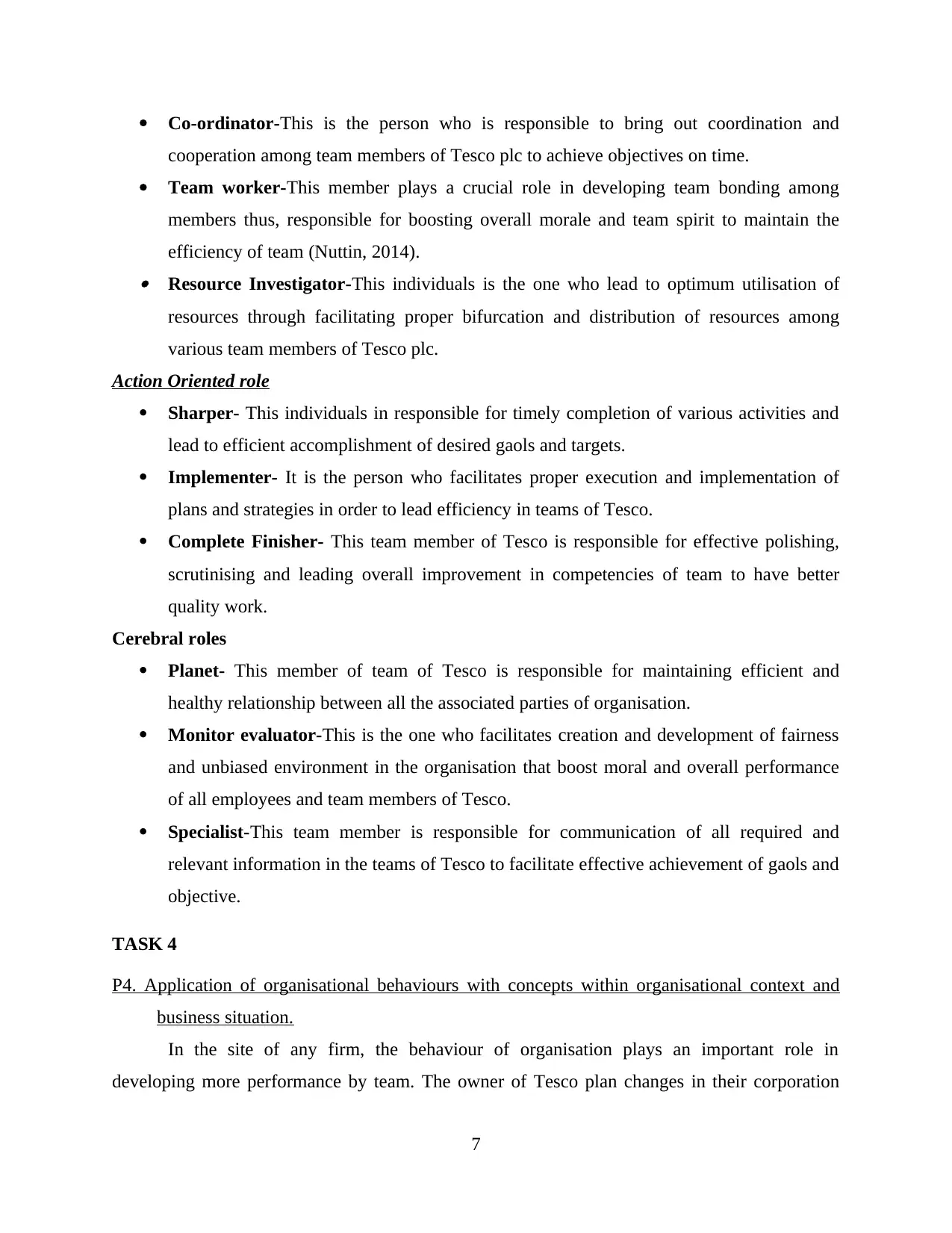
Co-ordinator-This is the person who is responsible to bring out coordination and
cooperation among team members of Tesco plc to achieve objectives on time.
Team worker-This member plays a crucial role in developing team bonding among
members thus, responsible for boosting overall morale and team spirit to maintain the
efficiency of team (Nuttin, 2014). Resource Investigator-This individuals is the one who lead to optimum utilisation of
resources through facilitating proper bifurcation and distribution of resources among
various team members of Tesco plc.
Action Oriented role
Sharper- This individuals in responsible for timely completion of various activities and
lead to efficient accomplishment of desired gaols and targets.
Implementer- It is the person who facilitates proper execution and implementation of
plans and strategies in order to lead efficiency in teams of Tesco.
Complete Finisher- This team member of Tesco is responsible for effective polishing,
scrutinising and leading overall improvement in competencies of team to have better
quality work.
Cerebral roles
Planet- This member of team of Tesco is responsible for maintaining efficient and
healthy relationship between all the associated parties of organisation.
Monitor evaluator-This is the one who facilitates creation and development of fairness
and unbiased environment in the organisation that boost moral and overall performance
of all employees and team members of Tesco.
Specialist-This team member is responsible for communication of all required and
relevant information in the teams of Tesco to facilitate effective achievement of gaols and
objective.
TASK 4
P4. Application of organisational behaviours with concepts within organisational context and
business situation.
In the site of any firm, the behaviour of organisation plays an important role in
developing more performance by team. The owner of Tesco plan changes in their corporation
7
cooperation among team members of Tesco plc to achieve objectives on time.
Team worker-This member plays a crucial role in developing team bonding among
members thus, responsible for boosting overall morale and team spirit to maintain the
efficiency of team (Nuttin, 2014). Resource Investigator-This individuals is the one who lead to optimum utilisation of
resources through facilitating proper bifurcation and distribution of resources among
various team members of Tesco plc.
Action Oriented role
Sharper- This individuals in responsible for timely completion of various activities and
lead to efficient accomplishment of desired gaols and targets.
Implementer- It is the person who facilitates proper execution and implementation of
plans and strategies in order to lead efficiency in teams of Tesco.
Complete Finisher- This team member of Tesco is responsible for effective polishing,
scrutinising and leading overall improvement in competencies of team to have better
quality work.
Cerebral roles
Planet- This member of team of Tesco is responsible for maintaining efficient and
healthy relationship between all the associated parties of organisation.
Monitor evaluator-This is the one who facilitates creation and development of fairness
and unbiased environment in the organisation that boost moral and overall performance
of all employees and team members of Tesco.
Specialist-This team member is responsible for communication of all required and
relevant information in the teams of Tesco to facilitate effective achievement of gaols and
objective.
TASK 4
P4. Application of organisational behaviours with concepts within organisational context and
business situation.
In the site of any firm, the behaviour of organisation plays an important role in
developing more performance by team. The owner of Tesco plan changes in their corporation
7
⊘ This is a preview!⊘
Do you want full access?
Subscribe today to unlock all pages.

Trusted by 1+ million students worldwide
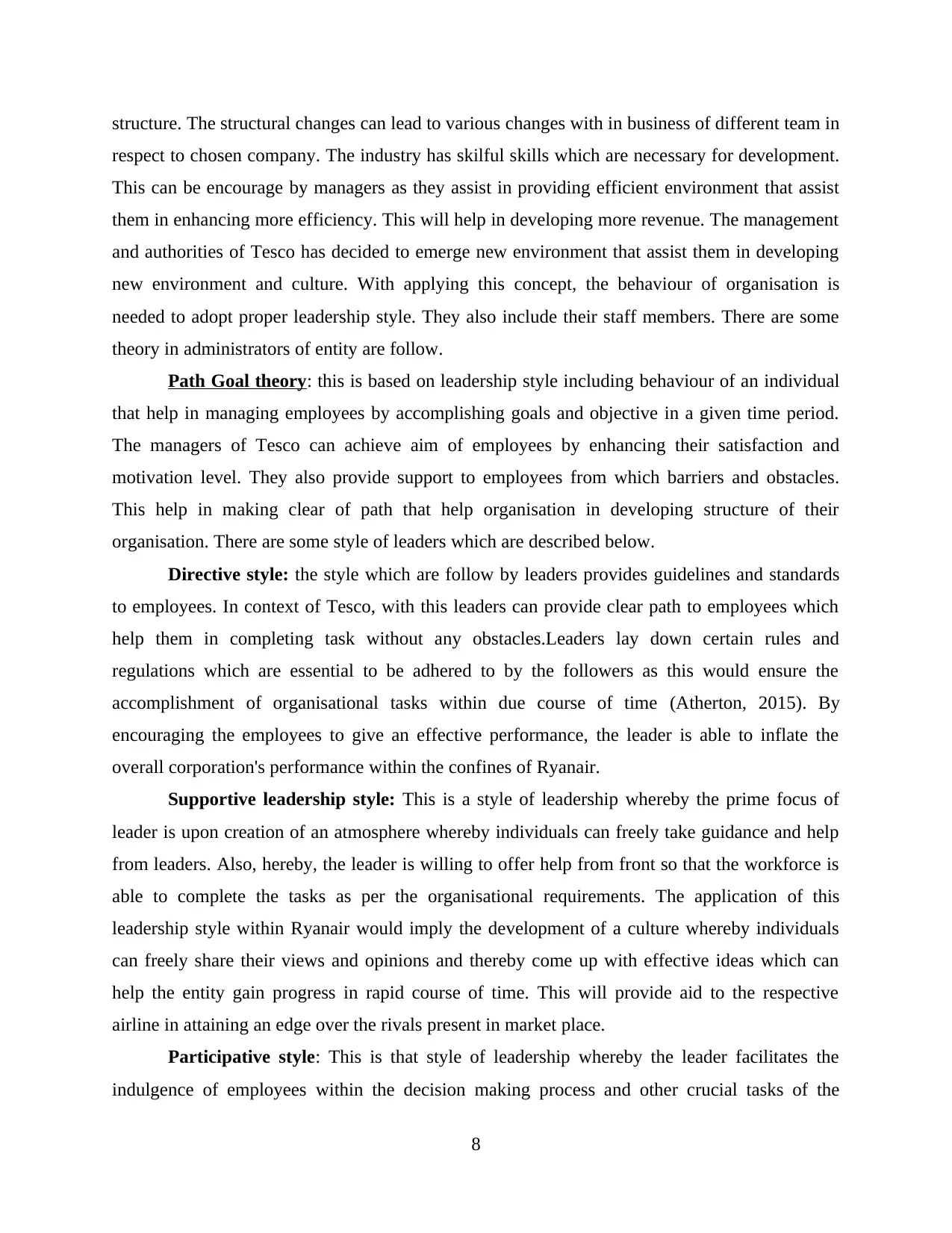
structure. The structural changes can lead to various changes with in business of different team in
respect to chosen company. The industry has skilful skills which are necessary for development.
This can be encourage by managers as they assist in providing efficient environment that assist
them in enhancing more efficiency. This will help in developing more revenue. The management
and authorities of Tesco has decided to emerge new environment that assist them in developing
new environment and culture. With applying this concept, the behaviour of organisation is
needed to adopt proper leadership style. They also include their staff members. There are some
theory in administrators of entity are follow.
Path Goal theory: this is based on leadership style including behaviour of an individual
that help in managing employees by accomplishing goals and objective in a given time period.
The managers of Tesco can achieve aim of employees by enhancing their satisfaction and
motivation level. They also provide support to employees from which barriers and obstacles.
This help in making clear of path that help organisation in developing structure of their
organisation. There are some style of leaders which are described below.
Directive style: the style which are follow by leaders provides guidelines and standards
to employees. In context of Tesco, with this leaders can provide clear path to employees which
help them in completing task without any obstacles.Leaders lay down certain rules and
regulations which are essential to be adhered to by the followers as this would ensure the
accomplishment of organisational tasks within due course of time (Atherton, 2015). By
encouraging the employees to give an effective performance, the leader is able to inflate the
overall corporation's performance within the confines of Ryanair.
Supportive leadership style: This is a style of leadership whereby the prime focus of
leader is upon creation of an atmosphere whereby individuals can freely take guidance and help
from leaders. Also, hereby, the leader is willing to offer help from front so that the workforce is
able to complete the tasks as per the organisational requirements. The application of this
leadership style within Ryanair would imply the development of a culture whereby individuals
can freely share their views and opinions and thereby come up with effective ideas which can
help the entity gain progress in rapid course of time. This will provide aid to the respective
airline in attaining an edge over the rivals present in market place.
Participative style: This is that style of leadership whereby the leader facilitates the
indulgence of employees within the decision making process and other crucial tasks of the
8
respect to chosen company. The industry has skilful skills which are necessary for development.
This can be encourage by managers as they assist in providing efficient environment that assist
them in enhancing more efficiency. This will help in developing more revenue. The management
and authorities of Tesco has decided to emerge new environment that assist them in developing
new environment and culture. With applying this concept, the behaviour of organisation is
needed to adopt proper leadership style. They also include their staff members. There are some
theory in administrators of entity are follow.
Path Goal theory: this is based on leadership style including behaviour of an individual
that help in managing employees by accomplishing goals and objective in a given time period.
The managers of Tesco can achieve aim of employees by enhancing their satisfaction and
motivation level. They also provide support to employees from which barriers and obstacles.
This help in making clear of path that help organisation in developing structure of their
organisation. There are some style of leaders which are described below.
Directive style: the style which are follow by leaders provides guidelines and standards
to employees. In context of Tesco, with this leaders can provide clear path to employees which
help them in completing task without any obstacles.Leaders lay down certain rules and
regulations which are essential to be adhered to by the followers as this would ensure the
accomplishment of organisational tasks within due course of time (Atherton, 2015). By
encouraging the employees to give an effective performance, the leader is able to inflate the
overall corporation's performance within the confines of Ryanair.
Supportive leadership style: This is a style of leadership whereby the prime focus of
leader is upon creation of an atmosphere whereby individuals can freely take guidance and help
from leaders. Also, hereby, the leader is willing to offer help from front so that the workforce is
able to complete the tasks as per the organisational requirements. The application of this
leadership style within Ryanair would imply the development of a culture whereby individuals
can freely share their views and opinions and thereby come up with effective ideas which can
help the entity gain progress in rapid course of time. This will provide aid to the respective
airline in attaining an edge over the rivals present in market place.
Participative style: This is that style of leadership whereby the leader facilitates the
indulgence of employees within the decision making process and other crucial tasks of the
8
Paraphrase This Document
Need a fresh take? Get an instant paraphrase of this document with our AI Paraphraser
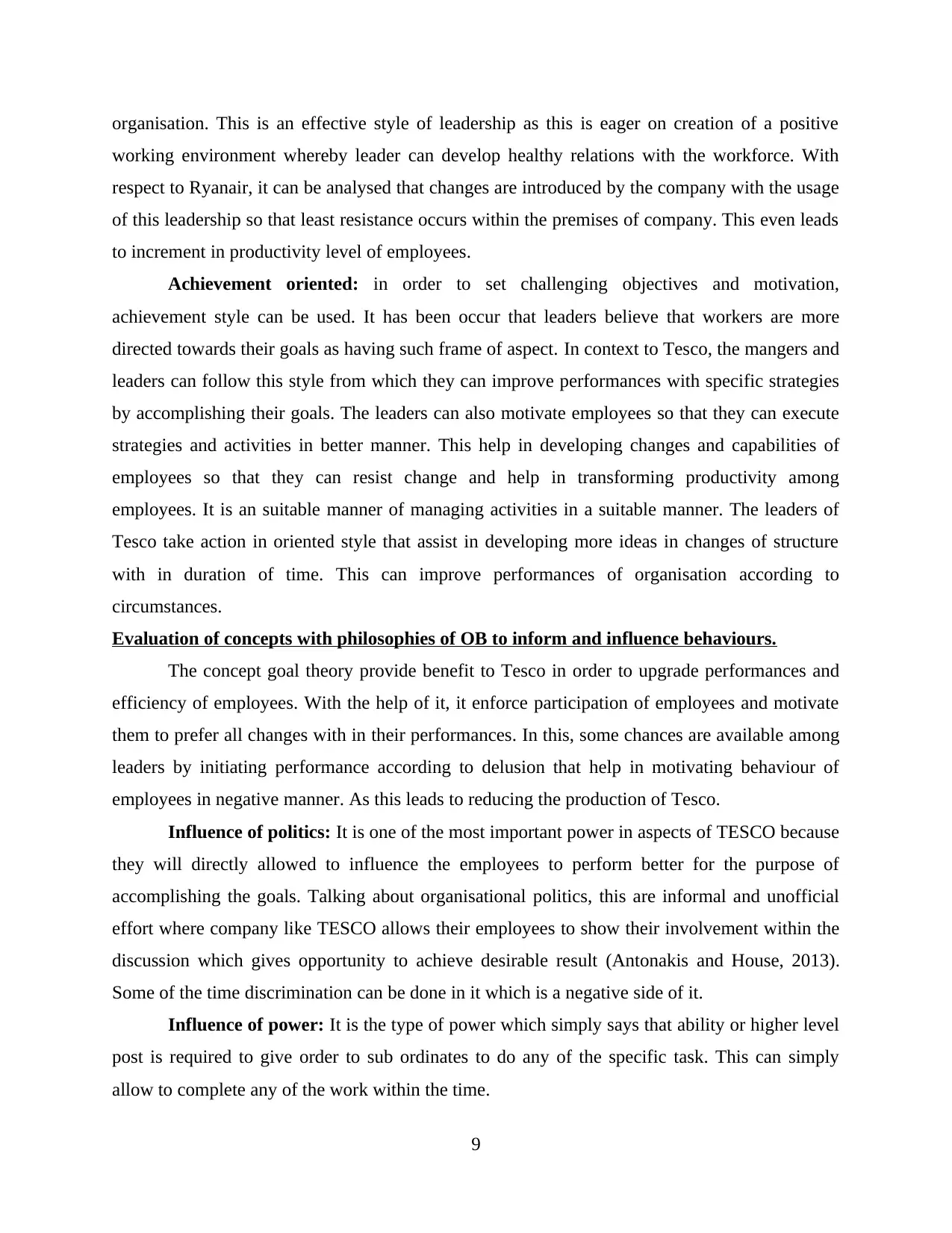
organisation. This is an effective style of leadership as this is eager on creation of a positive
working environment whereby leader can develop healthy relations with the workforce. With
respect to Ryanair, it can be analysed that changes are introduced by the company with the usage
of this leadership so that least resistance occurs within the premises of company. This even leads
to increment in productivity level of employees.
Achievement oriented: in order to set challenging objectives and motivation,
achievement style can be used. It has been occur that leaders believe that workers are more
directed towards their goals as having such frame of aspect. In context to Tesco, the mangers and
leaders can follow this style from which they can improve performances with specific strategies
by accomplishing their goals. The leaders can also motivate employees so that they can execute
strategies and activities in better manner. This help in developing changes and capabilities of
employees so that they can resist change and help in transforming productivity among
employees. It is an suitable manner of managing activities in a suitable manner. The leaders of
Tesco take action in oriented style that assist in developing more ideas in changes of structure
with in duration of time. This can improve performances of organisation according to
circumstances.
Evaluation of concepts with philosophies of OB to inform and influence behaviours.
The concept goal theory provide benefit to Tesco in order to upgrade performances and
efficiency of employees. With the help of it, it enforce participation of employees and motivate
them to prefer all changes with in their performances. In this, some chances are available among
leaders by initiating performance according to delusion that help in motivating behaviour of
employees in negative manner. As this leads to reducing the production of Tesco.
Influence of politics: It is one of the most important power in aspects of TESCO because
they will directly allowed to influence the employees to perform better for the purpose of
accomplishing the goals. Talking about organisational politics, this are informal and unofficial
effort where company like TESCO allows their employees to show their involvement within the
discussion which gives opportunity to achieve desirable result (Antonakis and House, 2013).
Some of the time discrimination can be done in it which is a negative side of it.
Influence of power: It is the type of power which simply says that ability or higher level
post is required to give order to sub ordinates to do any of the specific task. This can simply
allow to complete any of the work within the time.
9
working environment whereby leader can develop healthy relations with the workforce. With
respect to Ryanair, it can be analysed that changes are introduced by the company with the usage
of this leadership so that least resistance occurs within the premises of company. This even leads
to increment in productivity level of employees.
Achievement oriented: in order to set challenging objectives and motivation,
achievement style can be used. It has been occur that leaders believe that workers are more
directed towards their goals as having such frame of aspect. In context to Tesco, the mangers and
leaders can follow this style from which they can improve performances with specific strategies
by accomplishing their goals. The leaders can also motivate employees so that they can execute
strategies and activities in better manner. This help in developing changes and capabilities of
employees so that they can resist change and help in transforming productivity among
employees. It is an suitable manner of managing activities in a suitable manner. The leaders of
Tesco take action in oriented style that assist in developing more ideas in changes of structure
with in duration of time. This can improve performances of organisation according to
circumstances.
Evaluation of concepts with philosophies of OB to inform and influence behaviours.
The concept goal theory provide benefit to Tesco in order to upgrade performances and
efficiency of employees. With the help of it, it enforce participation of employees and motivate
them to prefer all changes with in their performances. In this, some chances are available among
leaders by initiating performance according to delusion that help in motivating behaviour of
employees in negative manner. As this leads to reducing the production of Tesco.
Influence of politics: It is one of the most important power in aspects of TESCO because
they will directly allowed to influence the employees to perform better for the purpose of
accomplishing the goals. Talking about organisational politics, this are informal and unofficial
effort where company like TESCO allows their employees to show their involvement within the
discussion which gives opportunity to achieve desirable result (Antonakis and House, 2013).
Some of the time discrimination can be done in it which is a negative side of it.
Influence of power: It is the type of power which simply says that ability or higher level
post is required to give order to sub ordinates to do any of the specific task. This can simply
allow to complete any of the work within the time.
9
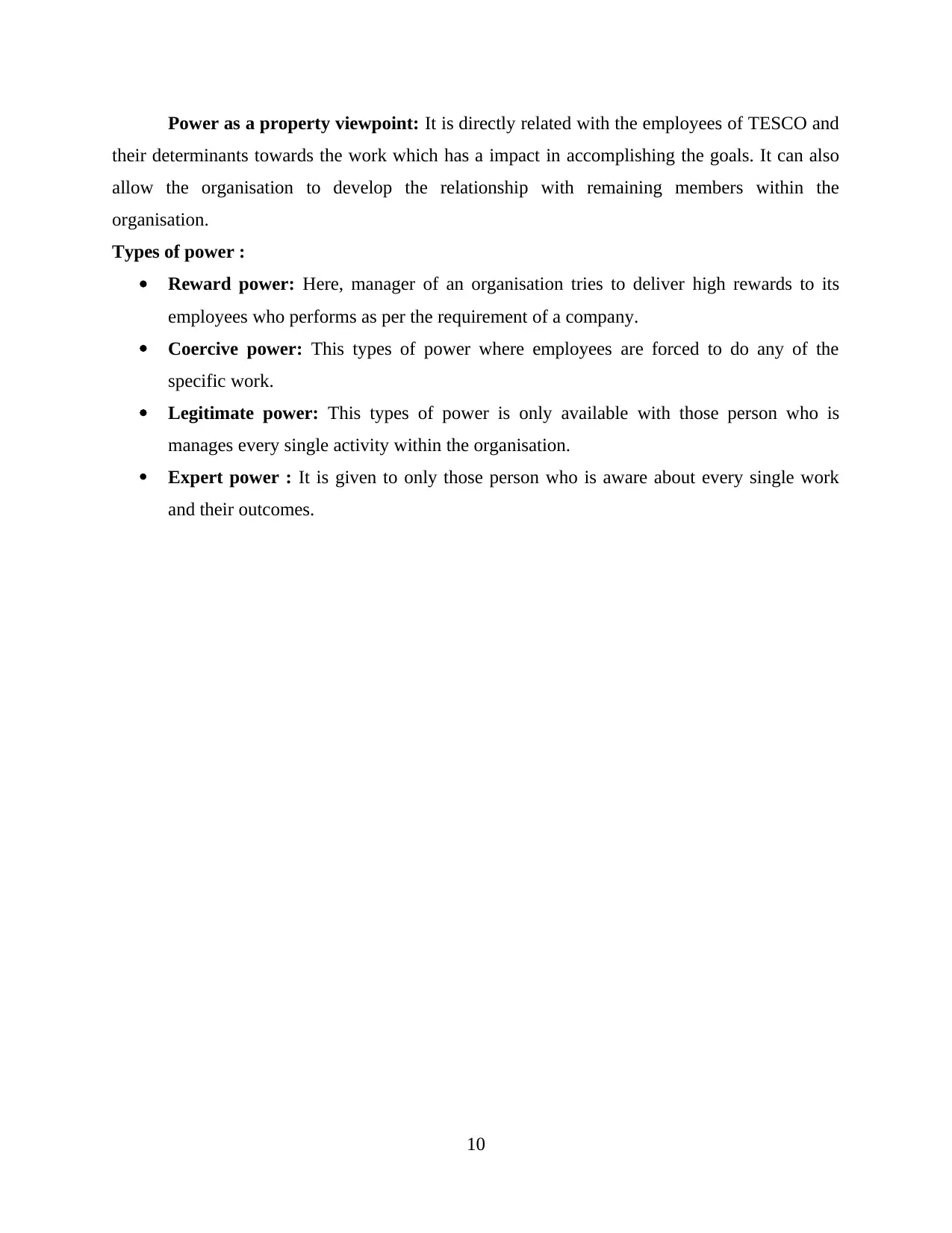
Power as a property viewpoint: It is directly related with the employees of TESCO and
their determinants towards the work which has a impact in accomplishing the goals. It can also
allow the organisation to develop the relationship with remaining members within the
organisation.
Types of power :
Reward power: Here, manager of an organisation tries to deliver high rewards to its
employees who performs as per the requirement of a company.
Coercive power: This types of power where employees are forced to do any of the
specific work.
Legitimate power: This types of power is only available with those person who is
manages every single activity within the organisation.
Expert power : It is given to only those person who is aware about every single work
and their outcomes.
10
their determinants towards the work which has a impact in accomplishing the goals. It can also
allow the organisation to develop the relationship with remaining members within the
organisation.
Types of power :
Reward power: Here, manager of an organisation tries to deliver high rewards to its
employees who performs as per the requirement of a company.
Coercive power: This types of power where employees are forced to do any of the
specific work.
Legitimate power: This types of power is only available with those person who is
manages every single activity within the organisation.
Expert power : It is given to only those person who is aware about every single work
and their outcomes.
10
⊘ This is a preview!⊘
Do you want full access?
Subscribe today to unlock all pages.

Trusted by 1+ million students worldwide
1 out of 14
Related Documents
Your All-in-One AI-Powered Toolkit for Academic Success.
+13062052269
info@desklib.com
Available 24*7 on WhatsApp / Email
![[object Object]](/_next/static/media/star-bottom.7253800d.svg)
Unlock your academic potential
Copyright © 2020–2026 A2Z Services. All Rights Reserved. Developed and managed by ZUCOL.





